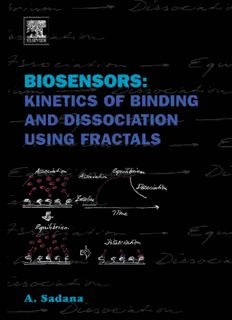Table Of ContentBiosensors:
Kinetics of Binding and Dissociation
Using Fractals
This Page Intentionally Left Blank
Biosensors:
Kinetics of Binding
and Dissociation
Using Fractals
A. Sadana
Departmentof ChemicalEngineering
UniversityofMississippi
University,MS, USA
2003
Amsterdam–Boston–Heidelberg–London–NewYork–Oxford
Paris–SanDiego–SanFrancisco–Singapore–Sydney–Tokyo
ELSEVIERB.V. ELSEVIERInc. ELSEVIERLtd ELSEVIERLtd
SaraBurgerhartstraat25 525BStreet TheBoulevard 84TheobaldsRoad
P.O.Box211 Suite1900 LangfordLane London
1000AEAmsterdam SanDiego Kidlington WC1X8RR
TheNetherlands CA92101-4495 OxfordOX51GB UK
USA UK
©2003ElsevierB.V.Allrightsreserved.
ThisworkisprotectedundercopyrightbyElsevierB.V.,andthefollowingtermsandconditionsapplytoitsuse:
Photocopying
Singlephotocopiesofsinglechaptersmaybemadeforpersonaluseasallowedbynationalcopyrightlaws.Permission
ofthePublisherandpaymentofafeeisrequiredforallotherphotocopying,includingmultipleorsystematiccopying,
copyingforadvertisingorpromotionalpurposes,resale,andallformsofdocumentdelivery.Specialratesareavailablefor
educationalinstitutionsthatwishtomakephotocopiesfornon-profiteducationalclassroomuse.
Permissions may be soughtdirectly from Elsevier’s Rights Department in Oxford, UK: phone: (+44) 1865 843830,
fax:(+44)1865853333,e-mail:permissions@elsevier.com.Requestsmayalsobecompletedon-lineviatheElsevier
homepage(http://www.elsevier.com/locate/permissions).
IntheUSA,usersmayclearpermissionsandmakepaymentsthroughtheCopyrightClearanceCenter,Inc.,222Rosewood
Drive, Danvers,MA01923,USA;phone:(+1)(978)7508400,fax:(+1)(978)7504744,andin theUK throughthe
CopyrightLicensingAgencyRapidClearanceService(CLARCS),90TottenhamCourtRoad,LondonW1P0LP,UK;
phone:(+44)2076315555;fax:(+44)2076315500.Othercountriesmayhavealocalreprographicrightsagencyfor
payments.
DerivativeWorks
Tablesofcontentsmaybereproducedforinternalcirculation,butpermissionofthePublisherisrequiredforexternal
resaleordistributionofsuchmaterial.PermissionofthePublisherisrequiredforallotherderivativeworks,including
compilationsandtranslations.
ElectronicStorageorUsage
PermissionofthePublisherisrequiredtostoreoruseelectronicallyanymaterialcontainedinthiswork,includingany
chapterorpartofachapter.
Exceptasoutlinedabove,nopartofthisworkmaybereproduced,storedinaretrievalsystemortransmittedinanyform
orbyanymeans,electronic,mechanical,photocopying,recordingorotherwise,withoutpriorwrittenpermissionofthe
Publisher.
Addresspermissionsrequeststo:Elsevier’sRightsDepartment,atthefaxande-mailaddressesnotedabove.
Notice
NoresponsibilityisassumedbythePublisherforanyinjuryand/ordamagetopersonsorpropertyasamatterofproducts
liability,negligenceorotherwise,orfromanyuseoroperationofanymethods,products,instructionsorideascontainedin
thematerialherein.Becauseofrapidadvancesinthemedicalsciences,inparticular,independentverificationofdiagnoses
anddrugdosagesshouldbemade.
Firstedition2003
LibraryofCongressCataloginginPublicationData
AcatalogrecordisavailablefromtheLibraryofCongress.
BritishLibraryCataloguinginPublicationData
AcataloguerecordisavailablefromtheBritishLibrary.
ISBN:0444515127
(cid:1)∞ The paper used in this publication meets the requirements of ANSI/NISO Z39.48-1992
(PermanenceofPaper).
PrintedinTheNetherlands.
This book is dedicated to my daughters,
Neeti and Richa
This Page Intentionally Left Blank
Foreword
Fewbioanalyticalmonitoringsystemshavemushroomedinpopularitytotheextentof
biosensors.Thegreatinterestinbiosensorsislargelyaresultofthewiseapplicability
of the method, and the considerable selectivity, good sensitivity, and possibility of
automation for bioanalysis. Biosensors have been of greater research interest during
thepasttenyearsandthistrendislikelytocontinueformanyyearswiththeexpanding
growthofbiotechnology.
Inthisfinebook,physicalprinciplesandbiochemicalmechanismsbasedonfractals
affectingbiosensordesignandthefoundationsofquantitativeanalysisarecoveredin
a tutorial manner. Dr. A. Sadana also covers in a logical thorough, and easily read-
able fashion such topics as fractal binding kinetics, DNA fractal dissociation, fractal
analysisofanalyte-estrogenreceptorbindingaswellasimportantbackgroundinfrac-
tals,instrumentation,methodologies,thepracticalaspectsofbiosensorassays,special
measurementmethods,andapplicationareasoffractals.
Becausethebookiswrittenbyoneauthorratherthanseveral(ormany,asinedited
volumes),thesymbols,units,terminology,andorganizationareconsistent,logicaland
clearthroughout.Thisbook,whichhastakenSadanaseveralyearstoprepare,should
be of considerable use to anyone who wishes to apply fractal analysis to biosensor
researchdesignandapplications.
I am proud to have prepared a foreword for such an outstanding book and a fine
friend.
TuanVo-Dinh
October2003 OakRidgeNationalLaboratory
This Page Intentionally Left Blank
Preface
Biosensors are finding increasing use in different areas of application which include
the biotechnologyand biomedicalindustry, pharmaceuticaland environmentalappli-
cations, diagnostic for health-related purposes, and currently for safety applications,
primarilyinsafeguardinghumanlivesandimportantcivilianstructuresandinfrastruc-
tures. Further detailed applications into the food industry (e.g., detecting and help
maintainingfoodfreshnessquality),and,ingeneral,makinglifeeasierandmorecom-
fortable(especiallyasfarasroutineapplicationsareconcerned)mayeasilybeenvis-
aged.
The importanceof biosensorsis predicatedprimarily inthattheyprovideveryfew
‘false positives’ in the area of application. Some times that is very critical and life-
threateningandinothersnotquiteso.Ifoneisdiagnosingforacriticalillness,orfora
chemicalorbiologicalthreat,orundermedicaloperationconditions,thentimeisofthe
essence, and a false positive is not an option, since critical decisions and subsequent
action are required to provide corrective action. If, on the other hand, one is using
the biosensorto monitorand controla parameter(such as temperatureorpH)in say,
afermentationreaction,afalsepositivemaybecostlyandirritable,butdefinitelynot
lifethreatening,andcorrectiveactionmaystillbetaken,perhapssecondtimearound.
In any case, it behooves one to know as much as one can about ones instruments
and diagnosticelements in the processestheyare used.Thus, the needto understand
the biosensor parameters such as stability, sensitivity, regenerability, specificity, and
response time. A better understanding of the kinetics of binding and dissociation of
theanalyteinsolutiontothereceptorsimmobilizedonthebiosensorsurfacewouldgo
alongwaytohelpunderstandbiosensoroperation,andprovideameansbywhichthe
parameterscouldbemanipulatedtoenhancetheusabilityofabiosensor.
A better understandingof biosensoroperationwouldalso openthe doors for other
applications.Afirstbookentitled“EngineeringBiosensors:KineticsandDesignAp-
plications”waswrittenandrecentlypublishedin2002thatprovidedthebasisforthe
theory(fractals)anddifferentapplications.Sincethen,biosensorapplicationshavein-
creased tremendously and the present manuscript attempts to delineate the different
exampleswherebiosensorshaveveryrecentlybeenusedtoadvantage.Allofthesere-
centexamplesthathaveappearedintheliteraturehaveashortcoming.Thereishardly
anykineticbasisfortheexamples.Thismanuscript,underonecover,providestheki-
neticbasisfortheapplicationsofbiosensorsinawidevarietyofareas.Eachofthese
differentareasiscoveredunderaseparatechapter.
Description:This title brings to the attention of researchers in the industry, and in academia, the application of fractals to help in modeling the analyte/receptor binding and dissociation kinetics on biosensor surfaces. The work builds on that done in Engineering Biosensors: Kinetics and Design Applications ,

